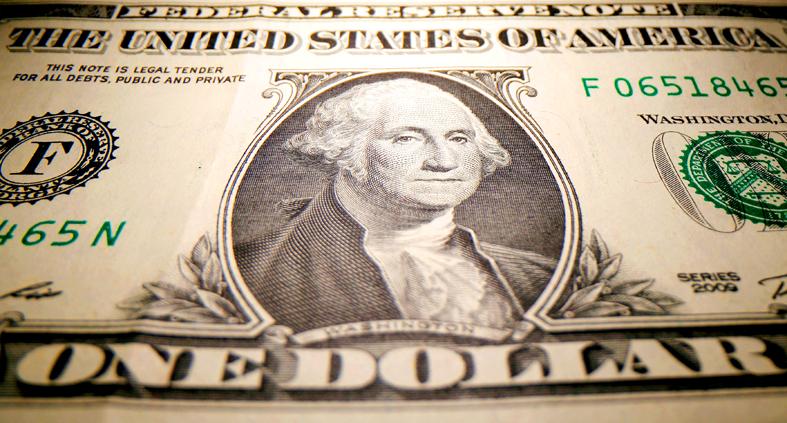The US dollar edged higher on Friday to post a weekly gain, supported by upbeat retail sales data boosting expectations that economic growth accelerated in the second quarter.
The US dollar index, which tracks the greenback versus a basket of six currencies, rose 0.1 percent to 92.71, up 0.63 percent from a week earlier — its biggest weekly rise in about a month.
US retail sales unexpectedly increased last month as demand for goods remained healthy even as spending was shifting back to services.

Photo: Reuters
Solid US data and a shift in interest rate expectations after the US Federal Reserve last month flagged sooner-than-expected hikes in 2023 have helped lift the US dollar in the past few weeks and made investors nervous about shorting it.
Friday’s gains for the greenback came despite Fed Chairman Jerome Powell on Thursday reiterating that rising inflation was likely to be transitory and that the US central bank would continue to support the economy.
“The data was consistent with the economy making substantial strides and cements expectations of very robust second quarter growth of around 10 percent,” said Joe Manimbo, a senior market analyst at Western Union Business Solutions in Washington.
“A backdrop of rising inflation, falling unemployment and a resilient consumer makes a compelling case for the Fed to unwind stimulus,” Manimbo said.
In Taipei, the New Taiwan dollar dropped against the US dollar on Friday, losing NT$0.113 to close at NT$28.005, but gained 0.29 percent from a week earlier. Turnover totaled US$1.208 billion during the trading session.
The New Zealand dollar gained 0.37 percent after data showed that New Zealand’s consumer prices rose far faster than expected, prompting some in the market to bet on a rate hike as soon as next month.
Sterling edged lower against the US dollar as investors sought safety in the greenback amid concerns over rising COVID-19 cases globally.
The Canadian dollar climbed 0.1 percent, helped by upbeat domestic wholesale trade data, a day after touching a near three-month low against its US counterpart.
Cryptocurrencies found support after recent turbulence, with bitcoin about flat on the day at US$31,835.59.
Additional reporting by CNA, with staff writer

Sweeping policy changes under US Secretary of Health and Human Services Robert F. Kennedy Jr are having a chilling effect on vaccine makers as anti-vaccine rhetoric has turned into concrete changes in inoculation schedules and recommendations, investors and executives said. The administration of US President Donald Trump has in the past year upended vaccine recommendations, with the country last month ending its longstanding guidance that all children receive inoculations against flu, hepatitis A and other diseases. The unprecedented changes have led to diminished vaccine usage, hurt the investment case for some biotechs, and created a drag that would likely dent revenues and

Macronix International Co (旺宏), the world’s biggest NOR flash memory supplier, yesterday said it would spend NT$22 billion (US$699.1 million) on capacity expansion this year to increase its production of mid-to-low-density memory chips as the world’s major memorychip suppliers are phasing out the market. The company said its planned capital expenditures are about 11 times higher than the NT$1.8 billion it spent on new facilities and equipment last year. A majority of this year’s outlay would be allocated to step up capacity of multi-level cell (MLC) NAND flash memory chips, which are used in embedded multimedia cards (eMMC), a managed

CULPRITS: Factors that affected the slip included falling global crude oil prices, wait-and-see consumer attitudes due to US tariffs and a different Lunar New Year holiday schedule Taiwan’s retail sales ended a nine-year growth streak last year, slipping 0.2 percent from a year earlier as uncertainty over US tariff policies affected demand for durable goods, data released on Friday by the Ministry of Economic Affairs showed. Last year’s retail sales totaled NT$4.84 trillion (US$153.27 billion), down about NT$9.5 billion, or 0.2 percent, from 2024. Despite the decline, the figure was still the second-highest annual sales total on record. Ministry statistics department deputy head Chen Yu-fang (陳玉芳) said sales of cars, motorcycles and related products, which accounted for 17.4 percent of total retail rales last year, fell NT$68.1 billion, or

In the wake of strong global demand for AI applications, Taiwan’s export-oriented economy accelerated with the composite index of economic indicators flashing the first “red” light in December for one year, indicating the economy is in booming mode, the National Development Council (NDC) said yesterday. Moreover, the index of leading indicators, which gauges the potential state of the economy over the next six months, also moved higher in December amid growing optimism over the outlook, the NDC said. In December, the index of economic indicators rose one point from a month earlier to 38, at the lower end of the “red” light.